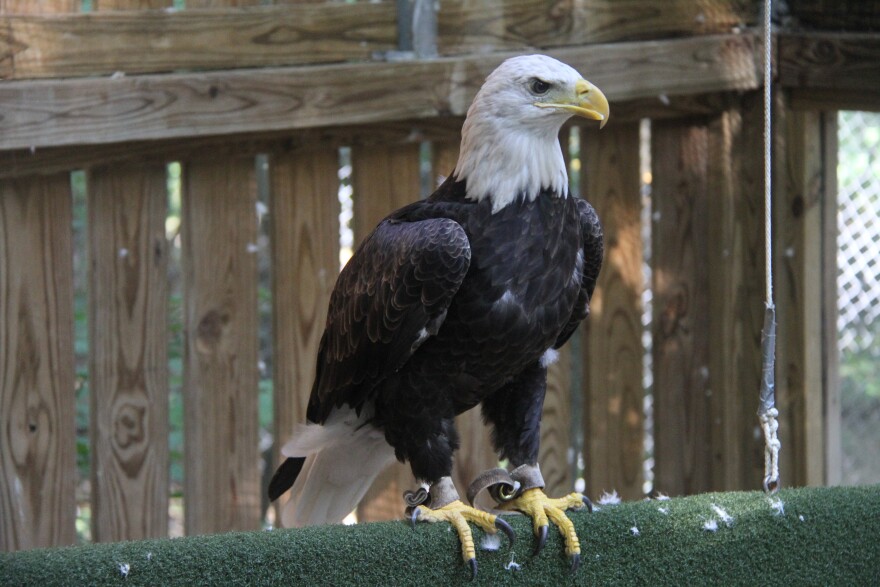Avian influenza is especially hard on raptors – hawks, falcons, eagles, osprey, kites, vultures, buzzards and owls, and it’s commonly spread by waterfowl according to Dr. Karra Pierce, director of veterinary services at the Wildlife Center of Virginia.
“They’re the biggest kind of reservoir host for this virus," she explains. "It actually doesn’t cause any signs in a lot of them, so a lot of them can be completely healthy yet spreading it around.”
Not so for birds of prey.
“It can cause respiratory signs. gastrointestinal signs, neurological signs, weakness, and it is almost 100% fatal." Pierce says.
The center has not yet seen patients with bird flu, but it’s worried about a unique group of employees – nearly a dozen raptors with lifelong injuries that keep them from hunting. They accompany staffers from the wildlife center on educational missions – to schools and public events.
“We have Buddy the Bald Eagle, three red tailed hawks – Rowan, Rosalie and Ruby. We have Hudson, a gyre falcon, we have Maggie a peregrine falcon. We have Verlin, an American kestrel and then we have Gus and Athena which are barred owls.”
Pierce worries they could be infected, so the center is taking special precautions.
“That means having quarantine periods, foot baths, gowns and booties. The people caring for the education ambassadors are people separate from those caring for wild patients in the hospital. We all change our shoes when we get here, and with the ambassadors their food is now being prepared in a separate place from where the wild bird food is being prepared – just to be extra, extra careful.”
The state’s poultry industry is also on guard, but so far there are no reports of bird flu in large agricultural operations and just one case reported in a backyard flock in mid-February. Four ducks shot by hunters have also tested positive for the virus, but Virginia has seen no cases of wild bird infection this spring. Veterinarian Pierce is hopeful the plague may have passed us by.
“The one thing about avian influenza virus is it does tend to be more of a problem when temperatures are colder, so as the summer heats up hopefully it will be less of a problem for us.”
In the meantime, she says, the public should watch for problems in their parks and yards.
“Certainly if you are finding multiple dead birds you are going to want to contact the Department of Wildlife Resources so they can investigate. The biggest risk we have is waterfowl, so if you have a wetland or something in your backyard, you’re going to want to monitor it pretty closely, but any unusual mass die-off of birds – more than five birds is what DWR is requesting right now – should be reported to their help line.”
Song birds are not especially vulnerable to avian influenza, and there is no consensus on what backyard birdwatchers should do.
“Some people are still saying you can keep your bird feeders out. Other people are taking them down. There are lots of different schools of thought. I would say this time of year there is plenty of food out there for birds, so if you do decide to take your bird feeder down, they should be fine. They are a low risk species but it’s not impossible for them to contract it. We’ve seen positive cases in blue jays already this year.”
And the wildlife center cautions that while bird flu may not be evident over the summer, It is closely tied to bird migration, so we could see a resurgence in the fall.
This report, provided by Virginia Public Radio, was made possible with support from the Virginia Education Association.


